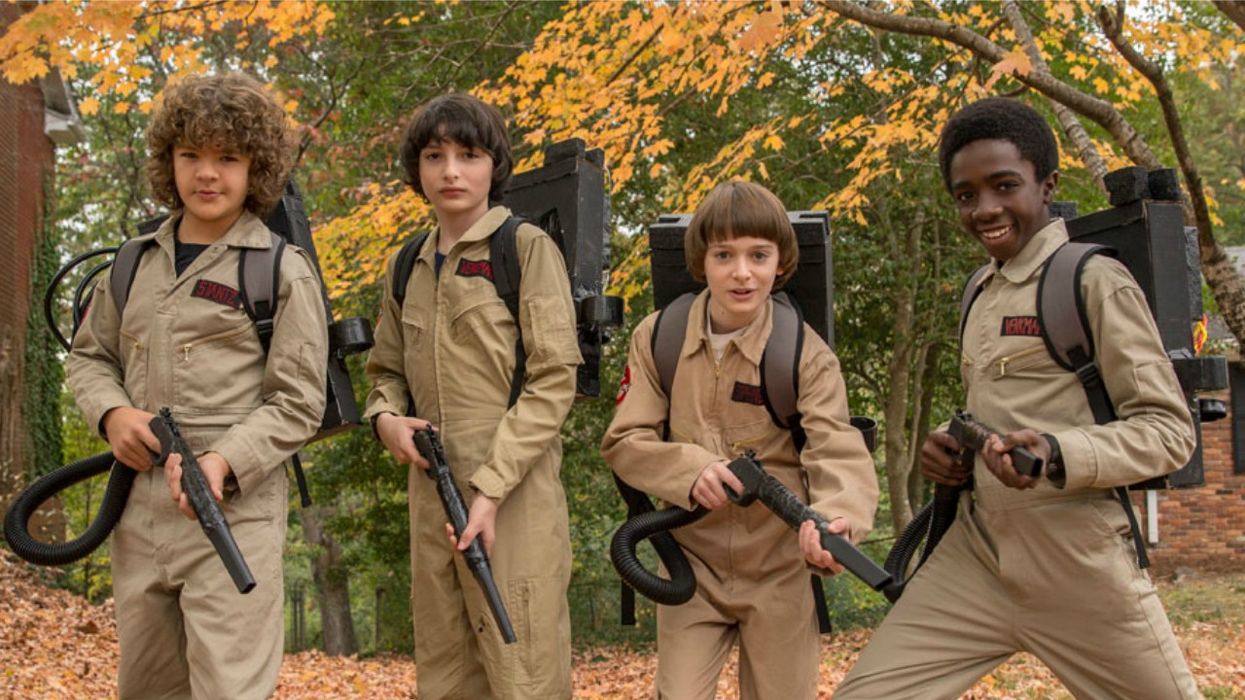Why Movies and TV Are Drunk on Nostalgia
Nostalgia for '80s and '90s properties is one of the most popular things driving current film and television like Halloween and Stranger Things. Here's why.

How come so many movies and TV shows references the 1980s? What's with people in futuristic film and TV wearing clothing or carrying objects from the past? And why do we have so many sayings about making things "great again?"
The answer is nostalgia.
What is Nostalgia in Film and TV?
What does nostalgia mean? Nostalgia is a sentimental longing for the past or events in the past. These emotions are typically for a period that contains happy personal associations, like a time in college or a coming of age.
Don't take it from me, listen to a doctor from an interview in Huffington Post. "Nostalgia is the warm, fuzzy emotion that we feel when we think about fond memories from our past," explains Erica Hepper, Ph.D., a lecturer in the School of Psychology at the University of Surrey in England. "It often feels bittersweet -- mostly happy and comforting, but with a tinge of sadness that whatever we’re remembering is lost in some way."
Why do we feel nostalgia?
In the same Huffington Post article, we learn that "Nostalgia increases feelings of social connectedness to others. Nostalgia makes people feel loved and valued and increases perceptions of social support when people are lonely."
Do you ever get nostalgic for things you didn't experience? Yes.
Anemoia is the feeling of nostalgia for a time you've never experienced. Like looking sepia-toned photos or being obsessed with the 1960s without having lived through them.
Nostalgia for something you've never experienced is common. Sometimes we get a picture of the past from our parents, history books, or legends that make us yearn for a time gone by, without understanding the reality of being there.
While we might be able to empathize with the events we didn't experience, we can't truly be nostalgic for them. Still, that gut feeling can help guide our emotions and get our butts into theaters to see movies or onto the couch to watch.
How nostalgia is used in film and television?
Nostalgia is almost like a drug. It creates chemical activity in your brain and makes you feel great. But it's also a tool used by filmmakers, marketers, and writers to help get you excited about different projects.
Nostalgia in Marketing
We recently covered a story that shows how Star Was is using their poster as an homage to Spielberg's Jaws.
These kinds of marketing efforts allow us to conjure up a feeling of excitement of a blockbuster level. But posters don't always work this subtly. Sometimes just using a classic artist can help us understand the vibe the movie wants. Like Spielberg did when he had Drew Struzan come back and do the Indiana Jones and the Kingdom of the Crystal Skull poster.
Or what about using an iconic score in a trailer to cement a character or story's place in our hearts...while in a reboot or sequel? Think about how your favorite trailers use songs to take you to a place.
Baba O'Reilly is a must for coming of age movie.
And Smash Mouth's All-Star plays over trailers for Digimon: The Movie, Inspector Gadget, Shrek, and Mystery Men. I have to admit that song makes me feel like a kid again. So maybe it works?
What about the simple idea that rebooting, remaking, and reunion shows?
These all play off our nostalgia for the original and how to bring new audiences by capitalizing on the feelings others have. Let us know your favorite nostalgia marketing tools in the comments.
Nostalgia examples in Screenwriting
Is there anything built on more nostalgia than Stranger Things? Every season capitalizes on the way audiences feel about different 1980s genres and films. This is all seen in cinematography, story beats, and even in costuming. Sometimes in overt mentions of franchises, foods, and locales like the arcade.
While writing, the Duffer brothers were able to craft a story that borrowed set pieces and emotional arcs from previous material. They molded them to their own tale but it was a clever way to get people excited about the series as well.
And speaking of the 1980s, let's talk Ready Player One and their treasure hunt. This movie was sold on a character's nostalgia and the entire thrust of the story is built around exploiting nostalgia to avoid dealing with the present.
But it's not just the 80s. People have been capitalizing on nostalgia forever. Think about George Lucas's American Graffiti. That movie's tagline was "Where were you in the summer of '62?" It legitimately sold itself on a generation looking back and feeling warm inside. A time before Vietnam and Nixon.
But it's not only about crafting the story. There are nostalgic elements in directing and shooting them too.
Nostalgia examples in Directing and Cinematography
If you're working on something with a lot of elements of the past, you have to make a ton of decisions on how to get there. Do you use certain filters or lenses to mimic what was used before?
How far can you branch out on your own without losing what made people nostalgic in the first place? Maybe you can shoot digital with a cleaner look, but you want to mimic the cinematography, just like they did in the Halloween reboot/sequel.
How can you make nostalgia your own?
Hollywood is the mixture of art and commerce. While nostalgic movies and television are greenlit every day, they don't always feel new and exciting.
Too much of an old thing can bore audiences over and over. So how can you use nostalgia with your own voice? I think Ryan Coogler's Creed does a great job of using the nostalgia of Rocky but updating the theme of the movie for the present.
The Rocky steps scene is so iconic, but this new tale bends what we expect from a Rocky movie. It's a return to the first film's reality. We see Philly as a gritty place where people are molded into who they are meant to be if they just work hard and stay tough.
While the shots of the run are the same, the population in them has changed. We see the reality of the community and understand that while time has gone by, the theme is still present.
If you attempt to write something based on nostalgia, try to figure out what you have to say about the property and why it matters now. Otherwise, you'll just make the same thing over and over.
What's next? Learn Ethos, Pathos, and Logos
The 'Modes of Persuasion' are at the root of all advertising. Those modes are called ethos, pathos, and logos. How can they work for you?













